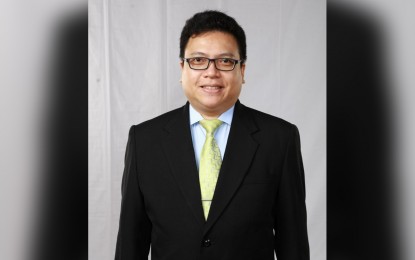
BUDGET SURPLUS. Rizal Commercial Banking Corp. chief economist Michael Ricafort. On Friday (May 27, 2022), Ricafort attributed the PHP4.9 billion budget surplus in April to several factors, among them the continued reopening of the economy that has allowed more businesses to operate. (Photo from RCBC)
MANILA – The continued reopening of the economy is seen to further lift the government’s revenue collections, as shown by the PHP4.9 billion budget surplus registered in April.
The Bureau of the Treasury reported on Friday that revenues in the fourth month this year rose by 19.19 percent year-on-year to PHP348 billion due to the strong contribution of all government collecting agencies.
The jump in revenues surpassed the 1.98 percent growth in expenditures to PHP343 billion.
Total revenues in the first four months of the year reached PHP1.132 trillion, up by 14.56 percent compared to the same period last year, while spending amounted to PHP1.444 trillion, 6.64 percent higher than in the same period last year.
This brought the budget gap to PHP311.9 billion, lower by PHP54 billion, or 14.76 percent than in end-April 2021.
Rizal Commercial Banking Corp. (RCBC) chief economist Michael Ricafort traced the budget surplus in April to several factors, among them the seasonal increase in tax revenues that month, the 45-day election ban on some infrastructure projects, and the continued reopening of the economy that has allowed more businesses to operate.
“Measures to further reopen the economy towards greater normalcy, such as the proposed nationwide Alert Level 1, would further help improve/increase the government’s tax revenue collections and also help curb the growth in government spending, especially on various Covid programs for the coming months/years,” Ricafort said.
He explained that with the change in government starting in the second half of this year, continuing the robust fiscal performance, along with the improvement in credit ratings of the country, “would depend on how the new Philippine president/administration would select a credible and competent Economic Team, intensified tax revenue collections, anti-corruption/anti-wastage/good governance for more effective government spending, as well as sustaining economic and fiscal/tax reform measures for the coming years when economic conditions improve further to at least pay for the increased government expenditures/budget deficits/debts incurred since the pandemic started in 2020.”
Ricafort said the decision to keep the excise taxes on petroleum products “would help sustain the government's recurring revenue collections and prevent (the) unnecessary widening of the country's budget deficit.”
This, he said, would help “limit/temper the increase in government borrowings and overall debt/debt-to-GDP ratio, at the very least, partly to help sustain the country's relatively favorable credit ratings and relatively lower borrowing costs at better terms from a bigger roster of international creditors/lenders.”
He also noted that all measures aimed at further increasing economic activities in the country “would help narrow the country’s budget deficit and help also temper the growth in the government’s debt stock.”
These factors are, however, seen to be countered by the possible continuation or increase in fuel subsidies for the transport and agricultural sectors, as well as a lower tariff on imported food, such as fish, rice, and meat.
“The new Philippine president/administration needs to sustain the country’s economic and fiscal reform measures, in terms of tax reform measures, intensified tax collections, structurally improve further the government’s recurring tax revenue collections, as well as good governance/anti-corruption/anti-wastage measures to further improve government expenditures,” Ricafort said.
These factors, he said, would “help better manage (the) country’s budget deficit, fiscal performance, and overall debt management, by helping ease the country’s debt-to-GDP (gross domestic product) ratio from the 60 percent international threshold recently through faster economic/GDP growth as seen in recent years/decades, to support the country’s long-term economic growth and development, especially for the coming generations.”
“These would also help sustain the country’s relatively favorable credit ratings of 1-three notches above the minimum investment grade,” Ricafort added. (PNA)
